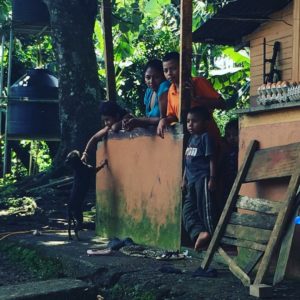The Texas A&M College of Agriculture and Life Sciences identified five Grand Challenges as complex problems facing our world. One of those challenges is the need for Enriching Our Youth. The challenge of enriching the lives of youth in Costa Rica has been approached through collaborative efforts to improve their education, health, and overall wellness. Overall health and wellness of the country’s youth has been improved with Costa Rica’s social security system by providing them with quality healthcare and vaccinations.

Farmer’s daughter wanting to help her mother and father make cheese at Chrisley’s Dairy farm in San Isidro, Costa Rica.
The Costa Rican government has partnered with private agencies to focus on the initiative to enrich the lives of their youth. Progressive policies have improved the quality of life and the ability to access resources for many Costa Rican families. The Texas A&M Agricultural Leadership and Education study abroad program provided me with a firsthand look at how “partnering of multiple sectors” improves the overall well-being of communities.
The World Factbook reports Costa Ricans have access to “education, healthcare, clean water, sanitation, and electricity” and these services have improved the standard of living and the life expectancy rate. Costa Rica’s poverty rate is reported to be lower than in most Latin American countries. By the Costa Rican education system enriching the youth of Costa Rica, students have a bright future as highly skilled professionals.
The Texas A&M AgriLife research and outreach has helped guide citizens worldwide about the importance of educating youth in specific skills required to be successful productive members of society. The enhancements in education for Costa Rican youth have provided opportunities for children to attend school and develop skills that will help them to get jobs when they grow up. Internations.org states that almost every Costa Rican child attends school from ages 6 to 13. Students have choices between a five-year academic secondary school and a six-year technical school. Both schools qualify students to attend universities.
There are four public universities and several private schools where students continue their education to prepare for their future. The Ministry of Education implemented computer science and English into the curriculum to give students the skills needed to keep up with international standards. Internations.org reported 85% of students in primary schools take English classes. Costa Rican students are informed about their career choices and how educational decisions will affect their future in the developing technology and tourism industries.

Leave a Reply